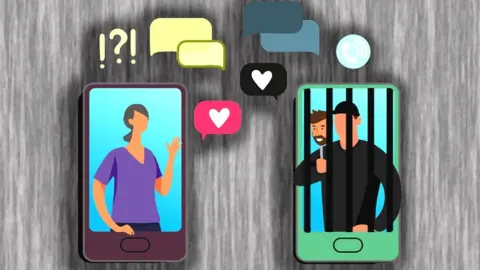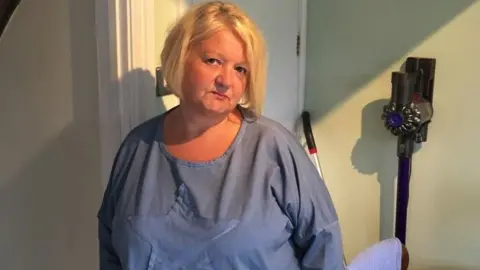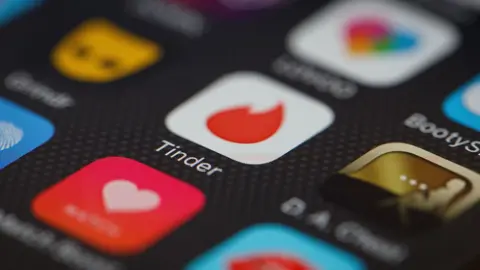Dating apps scam committed by criminal from inside prison
 Getty Images
Getty Images"It's one of the easiest ways to get money to be honest. If you've got a girl and she works and she's into you, why not ask her to send over money? Lawyers are the best obviously."
Jamie - not his real name - is in his early 20s .
For the last few years he made money by scamming women, usually those a lot older than him, who were looking for love.
He did this while in prison for an unrelated crime, using an illegal mobile phone he had hidden.
He was recently released and spoke to the BBC's File on 4 programme.
He says he will not commit the fraud again, and wants to make amends by exposing some of his tactics to serve as a warning to others.
'It was work'
"It was a last resort kind of thing, I just saw how easy it was," Jamie says.
"The most I ever got from a girl was £10,000... every week she was sending me £100, £200.
"I've forgotten her name now, I don't see it as a relationship, I [saw] it as work."
He says his accounts were blocked after the victims reported them, but he was never punished for the frauds.
He says people using dating apps should watch out for men contacting them who are a lot younger or "better looking", who start asking for money, especially if they have never met in person.
Jamie says he picked his targets by looking for those he thought likely to be lonely and lacking attention from others on the apps. His theory was that they would be more willing to "do anything" to avoid risk losing the connection.
And he says he would use his real photographs, confident that his looks would help lure victims in.
"I would go for older women and look for the desperation," he says.
"Keywords would be like 'I just want happiness' or something like that. I'll act cool at the start and if she talks back then I know she's interested just from my pictures.
"From then, that's when I start putting my game on, selling you dreams like 'I want a kid with you.'
"[I] just say everything that she wants to hear until she's fallen in love."
Until he felt that his victim was emotionally attached, Jamie said he wouldn't tell them he was in prison.
He claims that he often messaged women for months, charming them before revealing the fact.
When he did, he says he lied about the reason he was jailed, telling women it was for driving offences rather than violent crime.
'He was charming'
In 2020, there were nearly 7,000 reports of so-called romance fraud.
It cost victims almost £70m last year. And according to trade association UK Finance, there has been a 20% increase in bank transfers relating to romance fraud during the pandemic.
Di Pogson, a 59-year-old widow, gave away her entire life savings of £40,000 to someone she met on a dating app.
It turned out to be a scam. The man she'd fallen for did not really exist.

He was the creation of three fraudsters who preyed on vulnerable women across southern England.
"I always had in the back of my mind that I would never, ever be conned. I was too savvy," she says.
"But then 'Kevin' came along and he was charming. He was interested in me.
"It started off at just under £500 for his vet bills, and the sums gradually went up.
"When I completely ran out of money, he called me all sorts of names, he stopped answering his phone.
"Alarm bells rang and I went to the police."
She says she felt gullible and stupid.
"I told the children. It was horrible having to tell them I had lost so much money to somebody I had never met."
PC Bernadette Laurie, a financial abuse safeguarding officer, says many of the cases reported to police last year happened during lockdown, when people felt more lonely than usual.
Victims often discovered they had been fooled, she adds, when the criminals failed to meet up after the restrictions eased.
She recommends following advice by Action Fraud.

How to spot a scam
 Getty Images
Getty ImagesThese behaviours could signal your prospective partner is not what they claim to be:
- they ask a lot of personal questions about you, but are not interested in telling you much about themselves
- they invent a reason to ask for your help, using the emotional attachment they have built with you
- your continued relationship with them depends on you sending them money
- their pictures look professional and/or glamorous -they may have been stolen from an actor or model
One way of checking on photos can be to do a reverse image search via Google Images, Bing Visual Search, TinEye or another similar service.

Twenty-five of the UK's police forces also provided data in response to a freedom of information request made by File on 4.
This suggested that of the country's most popular dating apps, Tinder, Plenty of Fish and Grindr were the ones most associated with crime reports between 2018 and 2020.
Over this time, the number of crime reports associated with dating apps rose by 24% to 903 reports last year.
This is only a partial data set. Eighteen forces, including some of the country's biggest like the Metropolitan Police, Greater Manchester Police, PSNI, and Police Scotland, did not provide data, meaning the actual crime numbers are likely to be significantly higher.
The File on 4 documentary The Dangers of Dating Apps will be broadcast at 20:00 on Radio 4, Tuesday 23 February and then be available on BBC Sounds
